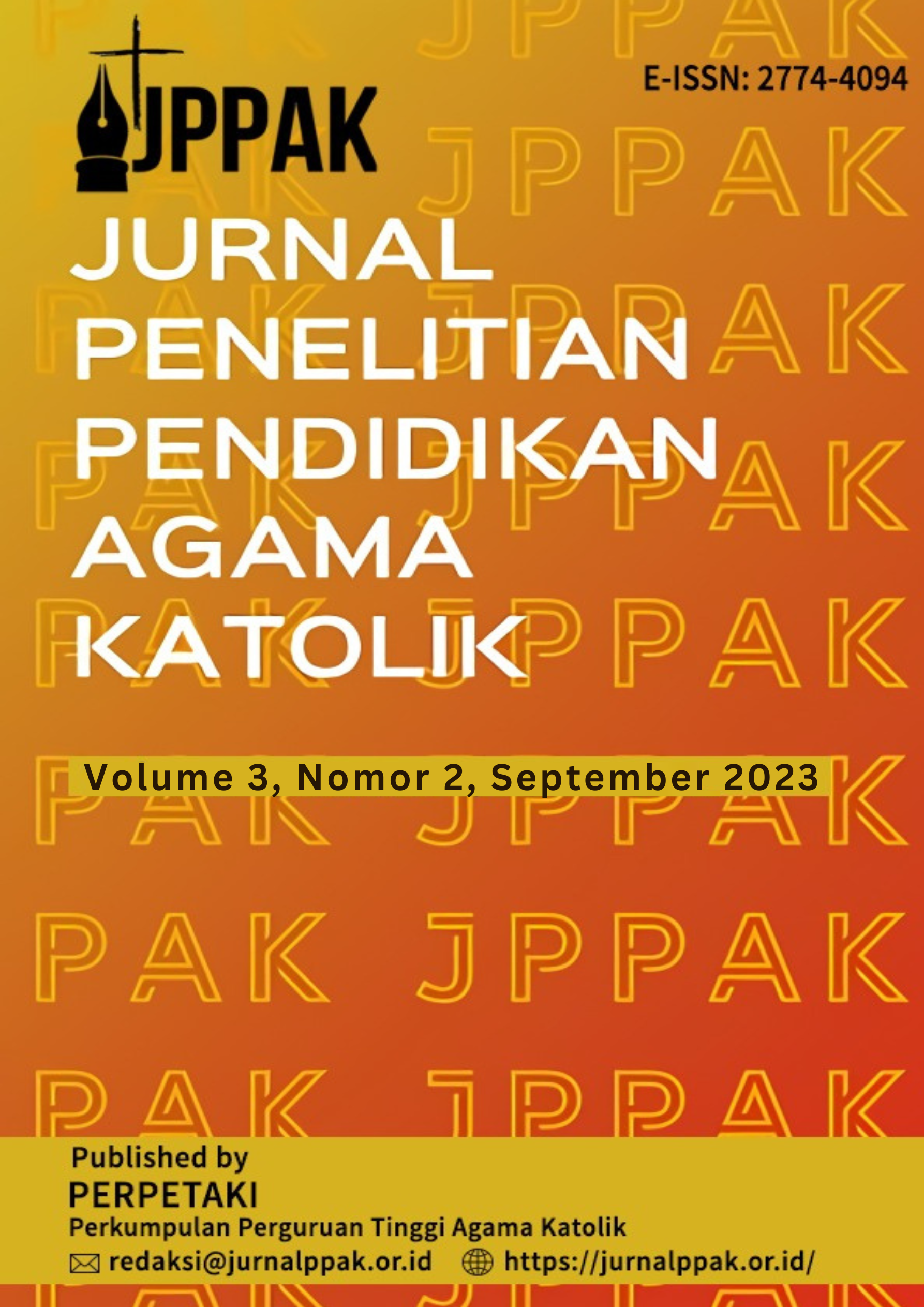Internalization of Catholic Character to Realize Smart Student Based On Communio at Catholic High School in Ruteng
DOI:
https://doi.org/10.52110/jppak.v3i2.92Keywords:
Internalization, Catholic Character, Communio, Smart StudentAbstract
This paper aims to describe the form of internalization of Catholic character in Catholic High School as an effort for community literacy. The study used the qualitative method. Data were analyzed by collecting, reducing, display and drawing conclusions or verification. Data processing is assisted by Atlas.ti software version 9.0.15. The result show that the obstacles to internalize Catholic characters are inconducive environmental, lack of teachers modeling, low learning motivation of student, and negative impact of digital technology. The form of internalizing Catholic character in the High School context must be inspired by “Communio” paradigm of the Catholic church. The basic spirit of Communio is Bible reflection by reading and member’s sharing experience to each other. There are forth efforts to internalize Catholic character. The first, environmental design with Catholic Spiritual nuances. Second, the formation of small spiritual groups such as Bible sharing groups, catechesis, devotions, Bible reading and quizzes competitions, and pilgrimages to the Catholic Spiritual sites. Third, integration of Information Technology-based spiritual development such as used of e-Catholic applications, Bible catechism vlogs, catholicity website, and other prophetic software. Fourth, character Catholic internalization based on dormitory system. This method is chosen to compose the sustainable, integrative, collaborative, and systematic of Catholic character internalization. However, this research, is still limited to the High School context, so it has not examined other level of formal school context. In addition, this research is still limited to formal school managed by Catholic foundations and headed by Catholic priest, clergy and religious sisters.
Downloads
##submission.downloads##
Submitted
Accepted
Published
How to Cite
Issue
Section
License
Copyright (c) 2023 Keristian Dahurandi, Emanuel Haru, Rikardus Moses Jehaut

This work is licensed under a Creative Commons Attribution-ShareAlike 4.0 International License.
Copyright Notice and Permissions
Jurnal Penelitian Pendidikan Agama Katolik offers immediate open access to all its content on the principle to make researches freely available to the public, especially to the scholars, to support greater global exchanges of knowledge. This journal encourages all scholarly authors to allow their research openly available, free access and without time restrictions.
All articles published Open Access will be immediately and permanently free for everyone to read and download. Under the CC BY-SA 4.0 license, authors retain ownership of the copyright for their article, however authors grant others permission to use the content of publications in Jurnal Penelitian Pendidikan Agama Katolik (JPPAK) in whole or in part provided that the original work is properly cited. Users (redistributors) of Jurnal Penelitian Pendidikan Agama Katolik (JPPAK) are required to cite the original source by including at least: the full title of the article, the author's or authors' full name(s), JPPAK as the initial source of publication, year of publication and volume number using a propriate citing method.
Copyright encompasses exclusive rights to reproduce and deliver the article in all form and media, including reprints, photographs, microfilms and any other similar reproductions, as well as translations. The reproduction of any part of this journal, its storage in databases and its transmission by any form or media, such as electronic, electrostatic and mechanical copies, photocopies, recordings, magnetic media is prohibited without consent of Jurnal Penelitian Pendidikan Agama Katolik (JPPAK).
Jurnal Penelitian Pendidikan Agama Katolik (JPPAK) is licensed under a Creative Commons Attribution Share-Alike 4.0 International. (CC BY-SA 4.0)
Authors who publish with Jurnal Penelitian Pendidikan Agama Katolik (JPPAK) agree to the following terms:
- Authors retain copyright and grant the journal right of first publication with the work simultaneously licensed under a Creative Commons Attribution Share-Alike 4.0 International (CC BY-SA 4.0) license that allows others to share the work with an acknowledgement of the work's authorship and initial publication in this journal.
- Authors are able to enter into separate, additional contractual arrangements for the non-exclusive distribution of the journal's published version of the work (e.g., post it to an institutional repository or publish it in a book), with an acknowledgement of its initial publication in this journal.
- Authors are permitted and encouraged to post their work online (e.g., in institutional repositories or on their website) after the publication on JPPAK, as long as it not published on other OJS for it will be treated as plagiarism by plagiarism checker apps. It can lead to productive exchanges, as well as earlier and greater citation of published work (See The Effect of Open Access).












